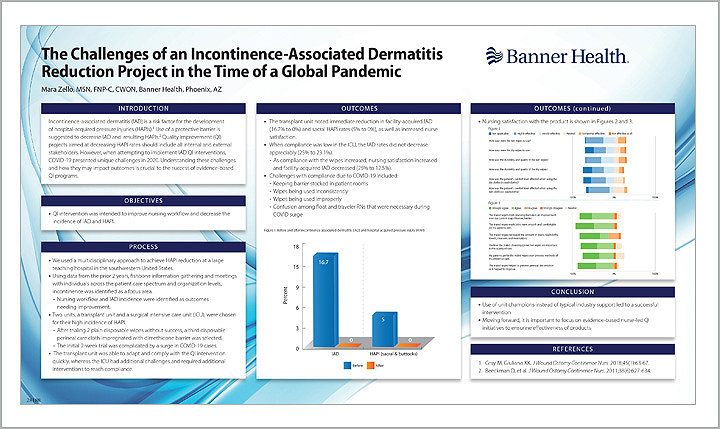Poster presented at WOCN shows Comfort Shield reduces incontinence-associated dermatitis (IAD)
19-Apr-2022
Incontinence-associated dermatitis is characterized as “skin damage (inflammation with or without erosion of the epidermis and dermis) following exposure to urine or stool”.1 It is a prevalent condition that has been found to be a risk factor for hospital-acquired pressure injuries (HAPIs).2
Seeking to reduce IAD at Banner Health
Mara Zello MSN FNP-C CWON RN, formerly a WOCN at Banner Health in Phoenix, AZ, led a study seeking a reduction in IAD due to high Hospital-Acquired Pressure Injury (HAPI) rates identified in a transplant PCU (24 beds) and trauma surgical ICU (22 beds). It was found that inconsistent use of topical products and rough washcloths were contributing factors to IAD in this PCU and ICU. A disposable perineal care cloth impregnated with dimethicone as a one-step process (Comfort Shield) was utilized over a five-month trial. Outcomes resulting in IAD, HAPI prevalence, compliance rate, and nurse satisfaction were measured.
Decreasing rates and increasing satisfaction
Initially, compliance rates varied between the PCU and the ICU. An immediate reduction in facility-acquired IAD (16.7% to 0%) was found in the PCU with great compliance. There wasn’t an appreciable decrease in facility-acquired IAD in the ICU where compliance was low (25% to 23.1%). However, once compliance increased in the ICU, facility-acquired IAD decreased from 25% to 0% and there was shown to be an increase in nurse satisfaction when using Comfort Shield in both units. These findings were presented in a poster format at the WOCN conference in June of 2021.3
Ultimately, these outcomes demonstrated that Comfort Shield is effective in reducing IAD and positively impacts nurse satisfaction.
References: 1. Gray M, (2014). Incontinence Associated Dermatitis in the Elderly Patient: Assessment, Prevention and Management*. (n.d.). Journal of Aging Life Care. 2. Doughty D, Junkin J, Kurz P, et al, (2012). Incontinence-associated dermatitis: Consensus statements, evidence-based guidelines for prevention and treatment, and current challenges. Journal of Wound, Ostomy, and Continence Nursing: official publication of The Wound, Ostomy and Continence Nurses Society, 39(3), 303-315. 3. Zello M, An Incontinence Associated Dermatitis Project and the Challenges Faced Due to a Global Pandemic, Poster presented at WOCN 2021.
28936

